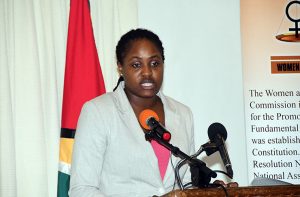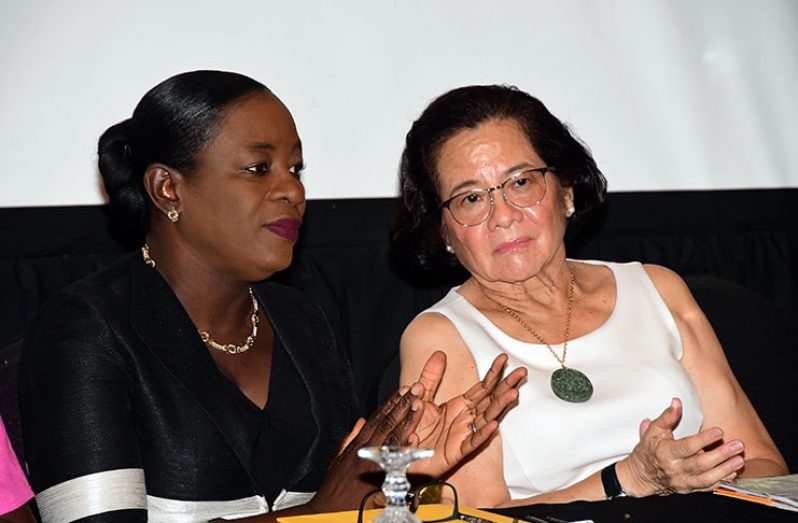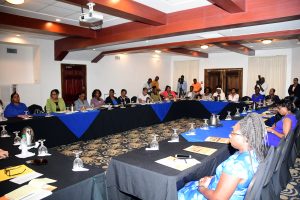– forum told
GUYANA needs more than the passage of legislation to change the negative stereotypes and practices which continue to hinder gender equity in the world of work.
This was the central message relayed by First Lady, Mrs Sandra Granger; Minister of Education, Dr. Nicolette Henry and Minister of Public Service, Tabitha Sarabo-Halley, on Wednesday. They all spoke at a Gender and Development Workshop for Permanent Secretaries hosted by the Women and Gender Equality Commission in collaboration with the United Nations Educational, Scientific and Cultural Organisation (UNESCO) at the Herdmanston Lodge.
Permanent secretaries attending were from all ministries and are in the strategic position to daily influence the experiences of women in their departments.
Speaking to the women and men present, the Frist Lady said that self-worth must be instilled in women to ensure they have the confidence in what they can accomplish.

She also pointed out that the current working environment must cater to the needs of women as they introduced the option of “flex time” which would allow women with young children to work from home in some cases.
She commended the Ministry of Public Health for raising the issue of extended maternity leave for women breastfeeding their babies
The First Lady also highlighted the importance of increasing the education and training of women in the working world to shift from traditional careers to the careers now in demand.
“Our women and girls seem to be stuck in the traditional areas of employment while the technology-driven world around us is rapidly changing, therefore, there is a need for recalibration,” she said, noting that some 90 per cent of jobs that women do are becoming obsolete.
Also pointed out was the need for workplaces to safe guard against acts such as sexual harassment; the need for equal pay for work of equal value and the need for women to be visible.
A CHANGED MINDSET
Meanwhile, Minister Sarabo-Halley stated that while gender equality is a human right and much progress has been made over the last few decades, women’s inequality continues to be nurtured by a historical existence of the patriarchal system.
Therefore, she expressed that it is necessary for institutions like the Women and Gender Equality Commission to point out existing gaps of inequality in systems and lobby for these to be filled.
Sarabo-Halley assured women in Guyana that they have the government’s full support towards working to address these issues and a great place to start is in the National Assembly.
“Even as we celebrate that both government and opposition Chief Whips are women and the present longest serving member of the National Assembly is also a woman – Minister Amna Ally – what is struggling is the fact that there exists no guarantee that gender equity will be achieved in the National Assembly because since 1966 the average women representation has been below 20 per cent. It’s hearting to know though that at this 11th Parliament there was 31 per cent or 22 women members of the 65 elected members and, for the first time since independence, this government has seven women ministers and a total of 14 women MPs,” she said.
She also note that 12 out of the 17 permanent secretaries are women.
The minster explained that the more women at the front line of government means that it will be more likely that changes which positively affect women will be acted on.
At the same, time she called on women to desist from using their positions to negatively affect the lives of other women for one reason or the other.
“It was his Excellency, President David Granger, who also said that the administration recognises that gender equality cannot be realised by only the passage of legislation. History proved this to be true. Instead there must be change of mindset,” she said.
EDUCATION IS KEY
In her address, Minister Henry told the gathering that many negative stereotypes of women still exist but education remains the gateway through which countries can achieve gender equality.
“We must resist limitations and gender stereotypes and advance the role of women in leadership and decision making,” Minister Henry said.
“As an advocate for both education and gender equity, I genuinely believe that creating pathways towards quality education is one of the most valuable social and economic investments a nation can make.”
She stressed the need for the labour force to be constantly updated to meet the skills demanded by an ever-changing labour market. Remarks came too from Secretary General of UNESCO, Patrice La Fleur, who stated that negative gender issues and behaviours are learned and can be unlearned with information sharing and discussions.
She expressed the hope that the workshop would encourage permanent secretaries to take time out from their schedules to engage in monthly discussions on gender equality.




.png)










